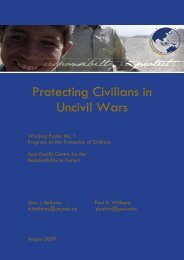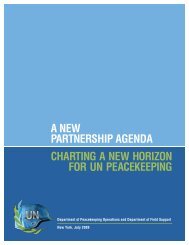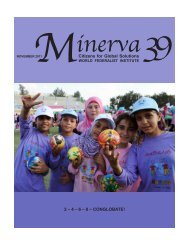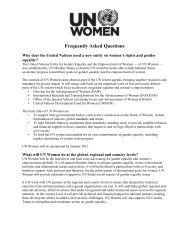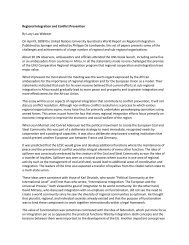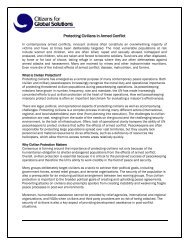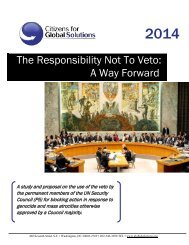Minerva, Spring 2008 (Volume 32) - Citizens for Global Solutions
Minerva, Spring 2008 (Volume 32) - Citizens for Global Solutions
Minerva, Spring 2008 (Volume 32) - Citizens for Global Solutions
Create successful ePaper yourself
Turn your PDF publications into a flip-book with our unique Google optimized e-Paper software.
issues [as] addressed in that draft, during<br />
1999 and 2000 the United States actively<br />
participated in further negotiations and<br />
joined consensus on the Rules of Procedure<br />
and Evidence and on the Elements of<br />
Crimes adopted in June 2000. On December<br />
31, 2000, the United States signed the<br />
Rome Statute of the ICC. But … on May<br />
6, 2002, President Bush took the unprecedented<br />
step of denying … [it].<br />
Nonetheless, there are alternative views<br />
that American engagement with the Court<br />
remains important <strong>for</strong> the long-term success<br />
of the Court and <strong>for</strong> the achievement<br />
of US <strong>for</strong>eign policy objectives. … [T]he<br />
Center <strong>for</strong> International Human Rights at<br />
Northwestern University School of Law<br />
and the Responsibility to Protect Coalition<br />
convened [this] conference … with<br />
those aims in mind.<br />
Fifty-five leading experts from the ICC,<br />
the International Criminal Tribunal <strong>for</strong><br />
the Former Yugoslavia, academia, nongovernmental<br />
organizations, the military,<br />
religious communities, and the federal<br />
court system attended the conference.<br />
Keynote addresses were delivered by<br />
Samantha Power, Harvard University’s<br />
Anna Lindh Professor of Practice of<br />
<strong>Global</strong> Leadership and Public Policy, Luis<br />
Moreno-Ocampo, chief prosecutor <strong>for</strong> the<br />
International Criminal Court, John Prendergast,<br />
director of the ENOUGH Project,<br />
Prince Zeid Ra’ad Zeid Al-Hussein,<br />
Jordan’s Ambassador to the United States<br />
and the <strong>for</strong>mer President of the Assembly<br />
of States Parties of the ICC, and US<br />
Army General Wesley Clark (ret.), <strong>for</strong>mer<br />
NATO Supreme Allied Commander.<br />
The goal of the conference was to <strong>for</strong>mulate<br />
recommendations on how the United<br />
States should take steps domestically and<br />
with other governments and international<br />
institutions to advance the R2P principle<br />
through the work of the ICC. Within this<br />
framework, the conference focused on<br />
three issues:<br />
1. The Political Strategy <strong>for</strong> American<br />
Cooperation/Participation re ICC<br />
2. The Military Strategy <strong>for</strong> American<br />
Cooperation/Participation re ICC<br />
3. The Political and Military Strategy <strong>for</strong><br />
Development of an International Marshals<br />
Service<br />
This report is the outcome of the conference.<br />
It [sets] out specific recommendations<br />
on how to raise awareness on the<br />
international justice elements of R2P, develop<br />
constructive support <strong>for</strong> US participation<br />
in the ICC, and lay the foundations<br />
<strong>for</strong> an institutional en<strong>for</strong>cement mechanism<br />
<strong>for</strong> the Court.<br />
I. Laying the Foundations <strong>for</strong> Ending<br />
Atrocity Crimes [history]<br />
II. Building Political Support <strong>for</strong> the<br />
International Criminal Court<br />
2.1 Understanding the Common<br />
Threads of R2P and the ICC<br />
The Responsibility to Protect Doctrine is<br />
a moral and ethical imperative that seeks<br />
to end atrocity crimes. While R2P offers<br />
a full range of measures <strong>for</strong> dealing with<br />
crimes against humanity, war crimes, and<br />
genocide, there has been no significant<br />
policy discussion on the punishment and<br />
accountability aspects of R2P. The doctrine<br />
significantly changed expectations<br />
at all levels about what is and is not acceptable<br />
conduct by States, and yet it is<br />
important to recognize that justice and the<br />
rule of law are significant components of<br />
the R2P matrix.<br />
27 • <strong>Minerva</strong> #<strong>32</strong> • June <strong>2008</strong><br />
The United States should strengthen its<br />
relationship with international and hybrid<br />
criminal justice institutions so that it can<br />
cooperate quickly and effectively with<br />
courts and tribunals in preventing mass<br />
atrocities. In particular, the ICC merits<br />
greater support from the United States if<br />
R2P is to be constructively advanced by<br />
the US Government. International consensus<br />
<strong>for</strong> the ICC is still growing, and<br />
the R2P concept can help build this consensus.<br />
As R2P is a mechanism concerned<br />
with prevention, protection, and rebuilding<br />
in situations of wide-spread atrocities,<br />
so too is the ICC focused on deterrence,<br />
hostility, cessation, and reconciliation in<br />
those same kinds of situations. Furthermore,<br />
R2P’s requirement to defer first to<br />
State sovereignty and then act if and when<br />
that State fails to demonstrate good faith<br />
in ending the violence, is also a critical<br />
element of the Rome Statute. By signing<br />
the ICC’s founding Rome Statute, a State<br />
agrees to the principle of complementarity,<br />
in which the ICC assumes jurisdiction<br />
over a case only when the State is unwilling<br />
or unable genuinely to carry out the<br />
investigation or prosecution.<br />
As a new and emerging framework in interstate<br />
relations, R2P is grounded in the<br />
rule of law that builds on the international<br />
legal and judicial systems. It is not, however,<br />
a legal construct that imposes legal<br />
responsibility on States or international<br />
organizations that fail to uphold R2P criteria.<br />
Rather, it shares with the ICC a moral<br />
commitment to ending atrocity crimes.<br />
2.2 Changing US Foreign Policy<br />
Perspectives<br />
The American public is justifiably concerned<br />
about America’s and the international<br />
community’s continued failure to<br />
deal effectively with atrocity situations.<br />
Darfur’s nightmare and the violence in<br />
the Democratic Republic of the Congo,<br />
Uganda, and the Central African Republic<br />
continue. Iraq and Afghanistan remain<br />
hostile and complex and US conduct at<br />
detention centers in Guantánamo, Iraq,<br />
Afghanistan and elsewhere, as well as<br />
the conduct of US contractors [such as]<br />
Blackwater and DynCorp, all point to the<br />
need to re-think US strategies <strong>for</strong> engaging<br />
in and ending wide-scale conflict.<br />
With the US presidential elections approaching,<br />
America is in a moment of serious<br />
political self-reflection. The United<br />
States should seek to re-cast its image<br />
both at home and abroad in order to distance<br />
itself from the perception (however<br />
ill-conceived) that America is the rudderless<br />
(even lawless) superpower and begin<br />
to conduct itself as the leading global<br />
power advancing global interests <strong>for</strong> the<br />
betterment of humankind. This trans<strong>for</strong>mation<br />
would emphasize cooperation,<br />
multilateralism, respect <strong>for</strong> rule of law,<br />
and a concerted ef<strong>for</strong>t to join the fight<br />
against impunity <strong>for</strong> atrocity crimes.<br />
In the aftermath of September 11, 2001,<br />
America’s leaders have seemed determined<br />
to wage a war against terrorism<br />
that leaves the impression, if not the reality,<br />
that the US is prepared to circumvent<br />
international law. A step in the right<br />
direction would be to move away from




